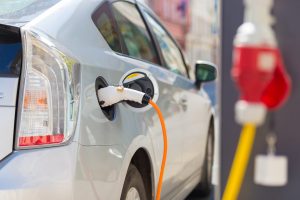Ahead of an election set for next year and following widespread disdain toward its new climate plan, announced ahead of the Glasgow climate conference late last month, the Morrison government in Australia has unofficially kicked off its election campaign by spruiking a new electric vehicle policy.
Prime Minister Scott Morrison said the government will spend $250 million to “deploy charging infrastructure in over 400 businesses, 50,000 households and 1000 public charging stations” to encourage the use of electric vehicles.
But Morrison’s electric vehicle policy isn’t actually new at all, and the prime minister aggressively attacked a similar policy set out by Australia’s opposition, the Labor party, during the last election.
“I’ll tell you what, it’s not going to tow your trailer. It’s not going to tow your boat,” Morrison said in 2019, ridiculing the policy set out by Labor, claiming they wanted to “end the weekend.”
After Morrison announced the electric vehicle policy on Wednesday, a reporter questioned him on his previous attacks on the same policy plan.
“In 2019, on 2GB you said, ‘what about all these charging stations, how much is that going to cost… If you have an electric car and live in an apartment are you going to run an extension cord down from your fourth-floor window,’ and now you’re focusing on infrastructure, so you have to admit it’s a pretty big conversion you’ve made. You can’t honestly say you weren’t attacking electric vehicles,” the reporter asked.
Morrison responded, stating that he didn’t have a problem with electric cars but rather with the opposition’s plan at the time.
“I don’t have a problem with electric vehicles, I have a problem with governments telling people what to do and what vehicles they should drive and where they should drive them, which is what [the opposition’s] plan was,” Morrison said.
“I’m not going to put up the price of petrol for families and make them buy electric vehicles and walk away from the things they have. That is not the Liberal way and the Nationals way.”
Morrison was again questioned on the backflip on breakfast show program “Sunrise” on Thursday morning, with host Natalie Barr correcting Morrison: “The Labor party were not forcing people. It was not a mandate at the last election that they were introducing, it was a non-binding target of 50 percent [of new cars to be electric by 2030]. Wasn’t that the same as yours?”
Opposition leader Anthony Albanese called Morrison a liar and questioned whether Australians could trust him.
“Last election, Scott Morrison said electric vehicles would ‘end the weekend.’ Today he’s saying electric vehicles are the future,” said Albanese. “Well, if Scott Morrison doesn’t have any regard for what he said yesterday, then why should you believe or trust what he says today?”
“He’ll say anything before an election and go back on it afterwards,” Albanese continued.
The questioning continued into Friday morning, with the host of radio station 3AW asking Morrison: “Prime Minister Scott Morrison, have you ever told a lie in public life?” To which Morrison response: “I don’t believe I have, no. No.”
Guardian Australia later ran a piece titled, “Scott Morrison says he ‘believes’ he has never told a lie in public life – was that a lie?” in which they note five separate instances in which Morrison likely lied, including the recent submarine saga with France.
Australian journalist and author of “The Game: A Portrait of Scott Morrison” Sean Kelly wrote: “For Morrison, each moment stands alone. For him, an interaction demands only what it demands: he will do what needs to be done at that precise point in time. He never feels, in himself, insincere or untruthful, because he always means exactly what he says; it is just that he means it only in the moment he is saying it. Past and future disappear.”

































